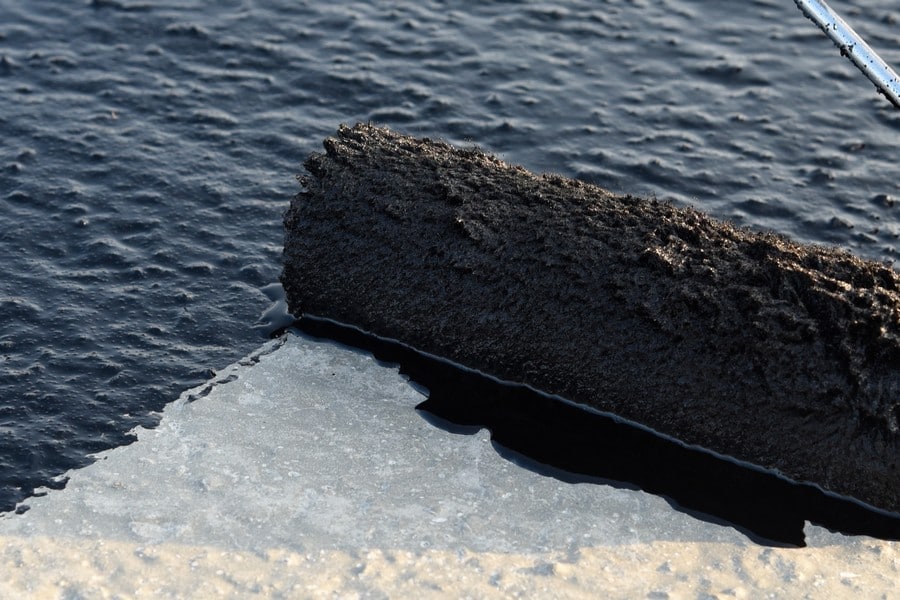Contact Brighton Damp Treatments Now to Speak With an Expert.

Mastic Asphalt, an ancient waterproofing compound dating back to the Phoenicians, offers unrivalled water-resistant protection of the highest quality which lasts for years. In 1837 Mr Claridge patented it in Paris and his invention – Claridge’s Patent Asphalt – has safeguarded some of Britain’s most esteemed buildings including St Paul’s Cathedral and Buckingham Palace.
The substance is composed of a blend of limestone, bitumen and advanced polymers. Its strength has earned it renown; able to withstand both pedestrian and vehicular traffic, it is non-toxic and non-flammable.
Asphalt is a mix of aggregates, sand and bitumen – the liquid binder that holds it together. To put it simply, Asphalt is similar to concrete while bitumen acts like cement in paving.

This material gives an outstanding wearing course and strong surface, ideal for car parks, HGV service decks and bridge decks incorporating asphalt as paving. Its durability and adaptability make it a superb waterproof covering for areas with high pedestrian traffic.
Mastic asphalt is utilised to cover roofs, tarmacs, parking areas, pathways, city streets, civic facilities and engineering works – all with the purpose of soundproofing.
Mastic asphalt should be applied in a single layer at a temperature between 175 and 230 degrees Celsius. Spread evenly via either manual or mechanical means on the prepped and levelled area.
Hot mastic asphalt is applied to the roof surface and covered with a jute cloth. This fabric is then sandwiched between two layers of mastic asphalt, with an additional layer above.
Mastic Asphalt is the ideal solution for creating robust, water-resistant damp proof membranes in various environments. This versatile material guards against air humidity, which is a frequent source of wetness problems. It can be deployed to ward off moisture in basements, bathrooms, cellars and crawl spaces among other locations. For decades it has been employed on sidewalks, bridges, parking lots and balconies – due to its unparalleled durability. With Mastic Asphalt applied in areas prone to penetrating dampness will no longer pose a problem. Damp Proofing Can Help Prevent:
Rising damp is a phenomenon that occurs when moisture from the ground penetrates into building foundations. It can cause serious damage to walls and other structures, leading to costly repairs or replacements. To prevent this from happening, it is important to ensure that any area prone to rising damp has adequate waterproofing measures in place.
Water entering the property can cause costly damage. The infiltration of water into the premises has the potential to cause extensive and expensive destruction.
Salt crystallization is a process in which salt molecules form into crystals. As the concentration of these molecules increases, they begin to gather together and take on an orderly arrangement. Over time, salt crystals can grow large enough to be visible with the naked eye. The likelihood of this increase in size depends on many factors such as temperature and salinity levels.
Mastic Asphalt boasts an impressive lifespan of over 50 years, making it the ideal choice for architects, engineers and homeowners in need of a waterproof membrane. Its remarkable resistance to water damage makes it popular for high-end projects like car parks, structures exposed to humidity and bridges. What’s more, its simple repairability if worn or damaged through its lengthy service life is another advantage that separates this product from the competition.
In the modern world, environmental conservation and sustainability are paramount. Mastic Asphalt stands out for its exceptional qualities; after being used for a prolonged period of time, it is totally recyclable. At the end of its useful life as a waterproofing material, it can be separated into individual components and reused.
No doubt, this is the premier industry to achieve Carbon Neutral status worldwide. We all understand that it’s essential to reduce our pollution; Mastic Asphalt provides a great way to do just that. If you are among the millions who will reap the rewards of Mastic Asphalt waterproofing, you’ll be doing your bit towards making the world a better place with zero CO2 emissions.
Designing is a key factor when constructing attractive asphalt roofs. Roof gardens can be vulnerable to damp due to the presence of plants and water,
so it’s essential to ensure effective waterproofing using Mastic Asphalt, which has been used successfully for up to 80 years in green roof projects.
Poured-in-place concrete also benefits from using this material as an ideal damp-proof membrane, preventing water seeping into its structure.

Mastic Asphalt is applied in its molten state, and it often gets confused with materials that require the use of naked flames or torches. For larger projects, this waterproofing substance is usually delivered to the job site in hot charge tankers for fast installation. It can be completed quickly – pre-heated solid blocks are placed into boilers at ground level for minor constructions. However, no flames are necessary during installation as Mastic Asphalt possesses an exceptional flame resistance and poses no risk of fire.
Mastic asphalt is highly resistant to fire due to its high mineral content. It passed all tests according to the prEN1187-1 and prEN1187-2 European draught standards, showing no considerable flame spread or penetration. BS1476 part 3:1975 further confirms that mastic asphalt systems meet all external fire resistance requirements for a roof covering, earning the maximum rating of p60 (aa). LPCP certification also guarantees their fire protection capabilities.
When it comes to safety, Mastic Asphalt is unbeatable. It’s non-flammable and nontoxic, making it safe for occupants of any structure treated with it. According to BS 1476 part 3:1975, Mastic Asphalt received the highest rating (p60), and meets European standards (prEN1187-1 & prEN1187-2). In addition, flames cannot pass through the material.
Research has found this material to be the most economical available. It is your only sensible choice when looking for waterproofing – it could save you up to 10-15% in comparison with alternatives and is renowned for its strength and longevity.
Manufacturers have recently developed innovative polymers which have greatly enhanced the durability of Mastic Asphalt. Thanks to modern technology, this material can now protect not only roofs and a few critical areas, but every part of your home vulnerable to water damage. It is able to resist various weathers, heat shock and everyday automobile and foot traffic. Additionally, it is cost-efficient due to its ease of repair.
All of our work is backed by our company’s warranties for your safety and security. We are also founding members of the Guarantee Protection Scheme, an independent insurance policy that covers the duration of your guarantee if you want to take it out.


Max and his team have been at our property all week and I really can’t thank them enough for the fantastic job they’ve done on plastering both our walls and ceilings. They have literally transformed the appearance of our house! Not only has Ma…
From start to finish Max has been incredable. His knowledge lin damp proofing is second to none and his team where very clean and polite. The plastered finish was like glass so happy we choose Max Plastering for job.
Lovely bunch of lads left a very neat and clean job. Problem was solved.
Perfect Finnish and all left clean and tidy and no mess. Used Max previously and would not hesitate to ask him carry out more work.
Max, Harvey and Stuart arrived promptly as arranged. Done a great job on our outside rear wall. Work completed to a high standard, removal of all old material and cleaned up after themselves. I am so pleased with the standard of their work they ar…
They turned up on time and carried out the works in a very professional manor leaving the front of the house clean and tidy. Very impressed would definitely recommend.
I have to say that on every level Max (with Stuart and Harvey) did an extremely professional job! They explained what they were going to do, they were polite and courteous and respected that they were coming into our home. The plastering is of the…
I called max and he managed to come around the same day to do a survey. The next day I received an extremely detailed survey compared to any other damp proofer which made me feel very at ease that he was going to do the right job. Max and team tur…
Contact Brighton Damp Treatments Now to Speak With an Expert.